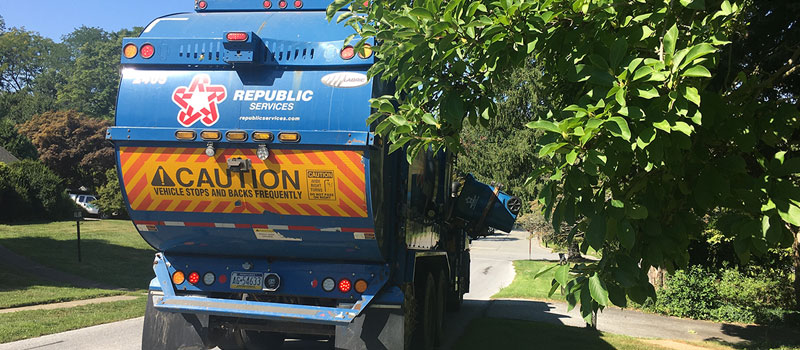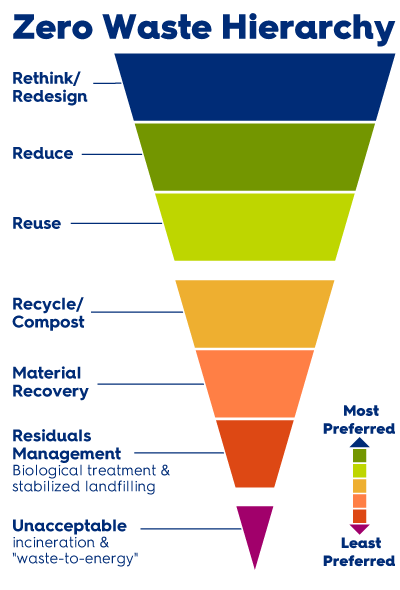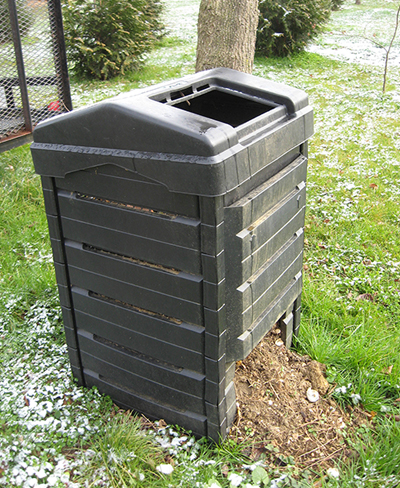How it Works
According to the U.S. Environmental Protection Agency, in 2018 Americans created approximately 292.4 million tons of trash and recycled or composted over 94 million tons of material, equivalent to a 32.1 percent recycling and composting rate. On average, we recycle and compost 1.57 pounds out of our individual waste generation of 4.9 pounds per person per day.
This tool describes how municipalities can use modern technologies and practices in the collection, transport, processing, and disposal of municipal solid waste (MSW) to extend the life of the county's landfills and increase county waste diversion through partnerships and community-wide collaborations.
Waste material must be managed in an environmentally responsible and cost-effective manner. Historically, solid waste was deposited in landfills or incinerated, and these continue to be the primary means of disposal. Both these methods have the potential for damaging the environment due to toxins leaching from landfills or air pollution from incineration. Recycling can also come with a high environmental cost: over 90 percent of the plastic ever created has not been recycled, even if it was put into a recycling bin. Much of that plastic ends up in a landfill, an incinerator, or the ocean.
Today, the concept of zero waste is being explored, going beyond recycling and composting to change lifestyle practices in a way that all otherwise discarded materials are designed to become a resource that another can use, eliminating it from ending up in a landfill. Zero waste is the conservation of all resources by means of responsible production, consumption, reuse, and recovery of products, packaging, and materials without burning and with no discharges to land, water, or air that threaten the environment or human health. EPA: Managing waste streams
The concept of zero waste is closely tied to the circular economy — a way of producing and consuming what we need in ways that eliminate waste and pollution, circulating products that are in their "highest and best" form for as long as possible, and producing with the goal of regenerating nature. Circle Economy
Current disposal technologies have reduced the potential for environmental contamination and landfills have evolved to contain liners and other means to prevent environmental damage, including some that capture landfill gas to be burned as a fuel to generate electricity. In 2018, the recycling, composting, combustion with energy recovery, and landfilling of solid waste prevented the generation of over 193 million metric tons of CO2, which is equivalent to the removal of 33 million cars from the road for one year. EPA: Facts and figures about materials, waste and recycling
Municipal choices related to solid waste hauling can also have an environmental and economic impact. Municipalities that do not contract with a single hauler leave hauler selection up to its residents. Although this allows for more choice, it also results in potentially higher prices for customers since companies cannot rely on economies of scale, as well as inefficiencies as trucks from multiple companies drive through the community. Switching to a single hauler can lower costs, reduce emissions of polluting greenhouse gases, and reduce traffic.
Benefits
Energy Conservation
Solid waste management programs conserve energy through resource recovery practices including recycling materials such as glass, composting, paper and cardboard, plastic bottles and metal.
Economies of Scale
The efficiency of Municipal Solid Waste programs can be increased when the volume and number of participants increases; governmental agencies are in the best positions to take advantage of these economies of scale though municipal-wide solid waste collection and recycling, as opposed to having private hauler contracts on an individual property basis that require more fuel and more miles traveled.
Greater Recycling Efficiency
Reducing the sorting required by citizens through single stream recycling and curbside compost collection may mean more eligible materials will be recycled, less raw materials need to be sourced, and less food waste enters landfills.
Reduced Collection Costs
Collection, transport, and disposal costs can be reduced through resource recovery and by reducing the amount of waste that is generated at the source. Reducing the amount of waste generated lessens the amount of waste going into a landfill and lessens the cost for disposal.
Environmental Benefits
Solid waste management, recycling, waste diversion and, composting, and resource recovery improves air and water quality and reduces greenhouse gas emissions.
Composting is the natural process of recycling organic matter, such as leaves and food scraps. When it decomposes, it turns into fertilizer that can enrich soil and plants. Anything that grows decomposes eventually, and composting simply speeds up the process.
Get Started
Landfilling and incineration of municipal solid waste has become less desirable and less cost-effective. This is due, in part, to environmental regulations, escalating collection and transportation costs, high land costs, and a desire to be better stewards of the environment for future generations. Our solid waste management system generates three percent of Chester County's total greenhouse gas emissions, not including emissions from hauling waste. It is in municipalities' long-term interest to reduce waste, expand recycling, and enable the reuse of materials. Municipalities should consider the following:
Participate in Waste Reduction and Recycling Efforts
Promoting source reduction of waste, reuse of materials, and recycling are all ways to manage materials that would otherwise be discarded into a landfill, help reduce disposal per capita, and reduce greenhouse gasses.
Create a Waste Diversion or Zero Waste Plan
These plans provide guidance for safe and responsible management of waste through diverting material from landfills and preventing waste generation. For those municipalities located in the Lanchester Landfill Service Area, municipalities and the Solid Waste Authority can measure if waste diversion policies and planning are having success.
Reducing Costs
The initial administrative and capital costs for municipal solid waste programs, costs for owning, operating, and maintaining vehicles to collect and transport materials, and processing facilities' operations can be significant. The cost of transporting solid waste from households, to processing plants, to recycling facilities can also be a limitation as fuel prices rise. Exploring ways to divert waste, reduce waste, and remove it from the waste stream will help municipalities reduce costs for the long-term.
Waste Reduction or Avoidance Practices
Wastes that are not created do not need to be managed. Municipalities can adopt methods of waste reduction such as reusing products and equipment and instituting repair programs that extend their service life, promote products that are designed to be refillable or reusable, and discourage the use of disposable products such as "throw-away" tableware and single use plastic bags.
"Pay as You Throw" Principle
This model prices the disposal of solid waste according to the per-unit amount of waste material, rather than based on a flat rate. This is a market-based approach that discourages waste production by essentially placing a tax on waste materials.
Composting
With approximately 12%-16% of waste in the Lanchester Service area consisting of food waste, the act of composting, a process of turning food and yard waste into compost — a material that enriches the soil and has economic value, could increase long-term capacity at the landfill. Some municipalities compost leaf and landscaping materials and then offer it to residents as soil amendments. The Chester County Solid Waste Authority works with municipalities to develop yard waste composting operations at municipal facilities. Additional opportunities are available for food waste collection through private composting companies, or municipalities could choose to do the composting themselves.

Implementation
Pennsylvania Act 101, the Municipal Waste Planning, Recycling and Waste Reduction Act, was adopted in July, 1988 and mandates recycling in Pennsylvania's municipalities. The Act requires counties to develop municipal waste management plans and provides grants to offset expenses. The goals of the Act are:
- To reduce Pennsylvania's municipal waste generation,
- To recycle at least 25 percent of waste (Pennsylvania's statewide recovery rate of recyclables today is 35%),
- To procure and use recycled and recyclable materials in state governmental agencies and
- To educate the public about the benefits of recycling and waste reduction.
Grant funds are available for the development of municipal recycling programs. Applications are online.
Municipalities are eligible for the following programs:
- Recycling Program Development and Implementation, which reimburses municipalities 90% of eligible recycling program development and implementation expenses.
- Recycling Performance Grants, also called tonnage grants, are based on the total tons of Act 101 materials recycled in a calendar year.
- Recycling Partnership Curbside Recycling Cart Grant is a non-profit offering grants for newly established residential collection containers to increase the participation of households. This program also provides technical assistance.
- Technical Assistance Grants. Grants of up to $7,500 are available to local governments to hire consultants to conduct research and recommendations to enhance recycling, composting and waste minimization programs.
- Zero Waste Grants are offered by the Chester County Solid Waste Authority up to $5,000 for local governments, local environmental committees, and non-profits in their service area to initiate and sustain waste reduction projects. If interested in this program, contact the Recycling Resources Manager.
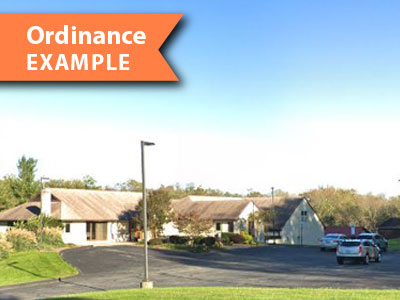
East Pikeland Township Ordinance, 2008
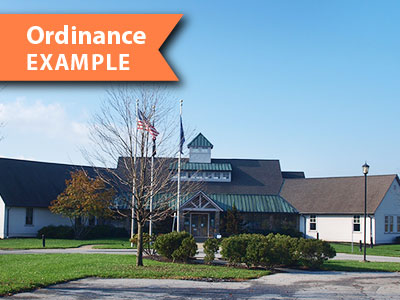
New Garden Township Ordinance, 2021

Media Borough in Delaware County has implemented a successful curbside composting program for residents.


